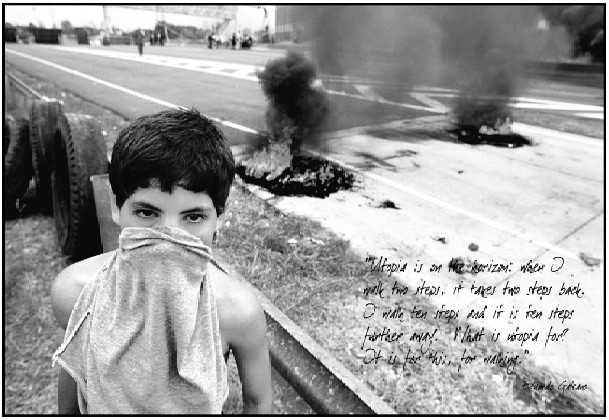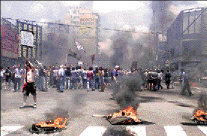archivio de los protestos globales
Struggles in Argentina
|
 |

Timetable
10 December 1999 - Fernando de la Rua inaugurated as president after campaigning on promises to revive economy after 10 years under the Peronist President Carlos Menem.
2000 - Strikes and fuel tax protests. Beef exports slump after an outbreak of foot-and-mouth disease. Soya exports suffer from concerns over the use of genetically modified varieties. The IMF grants Argentina an aid package of nearly 40 billion dollars.
24 August 2000 - Economy Minister Jose Luis Machinea says the 2000 budget will over shoot the $5.2bn target by 10%.
March 2001 - President de la Rua forms a government of national unity and appoints three finance ministers in as many weeks as cabinet. resignations and protests greet planned austerity measures.
2 March 2001 - Mr Machinea resigns on 2 March and is replaced by Ricardo Lopez Murphy.
16 March 2001 - Mr Lopez Murphy unveils a tough $4.45bn two-year austerity program with deep cuts in education.
19 March 2001 - Mr Lopez Murphy resigns after six government officials quit in protest over his policies.
20 March 2001 - Domingo Cavallo, a former economy minister under President Menem, is appointed and given special powers to restructure the economy.
3 June 2001 - Argentina says it swapped $29.5bn of debt, deferring $7.8bn in interest payments to 2002.
3 July 2001 - Stock market falls to 28-month low on rumours that President Fernando de la Rua will resign.
11 - 26 July 2001 - Three rating agencies slash Argentina's credit ratings.
30 July 2001 - The government's key austerity bills are passed, forcing an end to budget deficits, slashing state salaries and some pensions by up to 13%.
21 August 2001 - The International Monetary Fund (IMF) recommends an $8bn increase in Argentina's $14bn stand-by loan agreement.
August 2001 - A nation-wide mobilization of piqueteros managed to shut down over 300 highways across the country
1 November - Mr Cavallo announces new economic measures including a swap for most of the $132bn public debt.
30 November 2001 - Argentines withdraw about $1.3bn from their bank accounts.
1 December 2001 - Mr Cavallo announces restrictions on the amount of money the public is allowed to withdraw, aiming to halt the run on banks.
5 December 2001 - IMF announces it will not release $1.3bn in aid to Argentina because the austerity measures are not tough enough.
6 December 2001 - Mr Cavallo says private pension funds will be transformed into treasury bonds or government backed loans to service debts.
13 December 2001 - Unemployment hits 18.3% in October, the highest since mid-1998, and unions call a general strike.
14 December 2001 - Finance Secretary Daniel Marx quits but agrees to advise on debt restructuring talks.
17 December 2001 - The government presents its 2002 budget that includes spending cuts of nearly 20%.
18 December 2001 - IMF says Argentina can delay payment on a loan of about $940m due in January.
19 December 2001 - Argentina declares state of emergency to stop protests against Mr Cavallo's economic policies. The lower house of Congress repeals special powers granted to Mr Cavallo.
20 December 2001 - President de la Rua and Mr Cavallo resign as protests become widespread riots leaving more than 20 people dead.
21 December 2001 - President de la Rua reportedly charged with treason for unlawfully renegotiating the country's external debt.
Former Senate leader Ramon Puerta was appointed to head the government for 48 hours after Mr de la Rua's departure.
23 December 2002 - Congress has decided to make Adolfo Rodriguez Saa interim president.
28 December 2002 - Fresh protests in anger over Rodriguez Saa's appointment of officials seen as corrupt and his decision to maintain unpopular banking curbs. Demonstrators loot Congress.
31 December 2002 - R. Saa has resigned, just seven days after taking office.
1 January 2002 - The successor that is elected is Eduardo Duhalde, a former vice-president and current senator of Buenos Aires province.
26 June 2002 - Asesino de Dario Santillan



